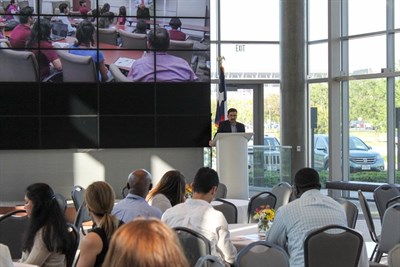The Nuclear Security Science and Policy Institute (NSSPI) held an event on April 25 to celebrate its 10th anniversary. NSSPI students, faculty and staff joined with administrators and collaborators from the Department of Nuclear Engineering at Texas A&M University, the Bush School of Government and Public Service and various other departments across The Texas A&M University System to mark this milestone. As part of the program, current NSSPI Director, Dr. Sunil Chirayath, along with founding NSSPI Director, Dr. William Charlton, and nuclear engineering Department Head, Dr. Yassin Hassan, spoke about the history of NSSPI and its success over the past 10 years.
 The Texas A&M University System Board of Regents established NSSPI as a joint institute of Texas A&M University and the Texas A&M Engineering Experiment Station (TEES) in March 2006. NSSPI was the first university-based institute with a higher-education mission in the United States to focus specifically on the technical aspects of nuclear security and the interface between nuclear security science and national and international policy. NSSPI's earliest activities focused on promoting graduate-level education and research in nuclear material safeguards, and enhancing national security against nuclear terrorism. This was done largely in collaboration with the Bush School. More recently, NSSPI has also become very involved in nuclear security workforce development abroad in countries such as India, Indonesia, Brazil, Jordan and Nigeria.
The Texas A&M University System Board of Regents established NSSPI as a joint institute of Texas A&M University and the Texas A&M Engineering Experiment Station (TEES) in March 2006. NSSPI was the first university-based institute with a higher-education mission in the United States to focus specifically on the technical aspects of nuclear security and the interface between nuclear security science and national and international policy. NSSPI's earliest activities focused on promoting graduate-level education and research in nuclear material safeguards, and enhancing national security against nuclear terrorism. This was done largely in collaboration with the Bush School. More recently, NSSPI has also become very involved in nuclear security workforce development abroad in countries such as India, Indonesia, Brazil, Jordan and Nigeria.
In the past 10 years, NSSPI students in the Department of Nuclear Engineering earned 49 Master of Science degrees, three Master of Engineering degrees, and 18 Ph.D. degrees through sponsored research in nuclear security and related topics. These students have gone on to jobs in various national laboratories, federal agencies, academia and the nuclear industry. NSSPI research projects have also supported numerous graduate students in other research areas within nuclear engineering, as well as other departments across campus, including the Bush School, mathematics, industrial and systems engineering, electrical engineering, political science, computer science, chemical engineering and statistics.
Not only do NSSPI students learn about nuclear security through traditional classes and laboratory exercises on campus, but they also get to experience nuclear security through hands-on short courses at national laboratories, international and domestic nuclear facilities experiences, interactions with other young nuclear security professionals around the world through international workshops and meetings, and research projects in nuclear security topics. Texas A&M also founded the first student chapter of the Institute of Nuclear Materials Management (INMM), which is advised by NSSPI faculty and has led to the creation of similar student INMM chapters in the United States and around the world.
As part of the celebration, NSSPI compiled a video of interviews from people who were instrumental to the founding and continued success of NSSPI as an organization, as well as videos from former students, current students and collaborators.